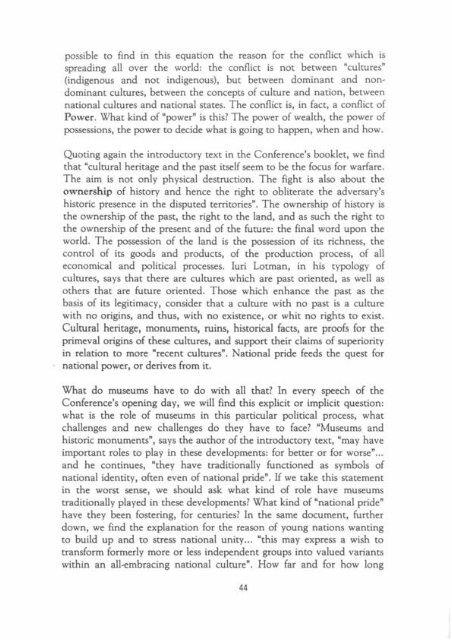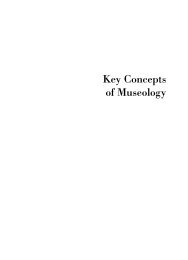ISS 25 (1995).pdf - The International Council of Museums
ISS 25 (1995).pdf - The International Council of Museums
ISS 25 (1995).pdf - The International Council of Museums
You also want an ePaper? Increase the reach of your titles
YUMPU automatically turns print PDFs into web optimized ePapers that Google loves.
possible to find in this equation the reason for the conflict which is<br />
spreading all over the world: the conflict is not between "cultures"<br />
(indigenous and not indigenous), but between dominant and nondominant<br />
cultures, between the concepts <strong>of</strong> culture and nation, between<br />
national cultures and national states. <strong>The</strong> conflict is, in fact, a conflict <strong>of</strong><br />
Power. What kind <strong>of</strong> "power" is this? <strong>The</strong> power <strong>of</strong> wealth, the power <strong>of</strong><br />
possessions, the power to decide what is going to happen, when and how.<br />
Quoting again the introductory text in the Conference's booklet, we find<br />
that "cultural heritage and the past itself seem to be the focus for warfare.<br />
<strong>The</strong> aim is not only physical destruction. <strong>The</strong> fight is also about the<br />
ownership <strong>of</strong> history and hence the right to obliterate the adversary's<br />
historic presence in the disputed territories". <strong>The</strong> ownership <strong>of</strong> history is<br />
the ownership <strong>of</strong> the past, the right to the land, and as such the right to<br />
the ownership <strong>of</strong> the present and <strong>of</strong> the future: the final word upon the<br />
world. <strong>The</strong> possession <strong>of</strong> the land is the possession <strong>of</strong> its richness, the<br />
control <strong>of</strong> its goods and products, <strong>of</strong> the production process, <strong>of</strong> all<br />
economical and political processes. Iuri Lotman, in his typology <strong>of</strong><br />
cultures, says that there are cultures which are past oriented, as well as<br />
others that are future oriented. Those which enhance the past as the<br />
basis <strong>of</strong> its legitimacy, consider that a culture with no past is a culture<br />
with no origins, and thus, with no existence, or whit no rights to exist.<br />
Cultural heritage, monuments, ruins, historical facts, are pro<strong>of</strong>s for the<br />
primeval origins <strong>of</strong> these cultures, and support their claims <strong>of</strong> superiority<br />
in relation to more "recent cultures". National pride feeds the quest for<br />
national power, or derives from it.<br />
What do museums have to do with all that? In every speech <strong>of</strong> the<br />
Conference's opening day, we will find this explicit or implicit question:<br />
what is the role <strong>of</strong> museums in this particular political process, what<br />
challenges and new challenges do they have to face? "<strong>Museums</strong> and<br />
historic monuments", says the author <strong>of</strong> the introductory text, "may have<br />
important roles to play in these developments: for better or for worse" ...<br />
and he continues, "they have traditionally functioned as symbols <strong>of</strong><br />
national identity, <strong>of</strong>ten even <strong>of</strong> national pride". If we take this statement<br />
in the worst sense, we should ask what kind <strong>of</strong> role have museums<br />
traditionally played in these developments? What kind <strong>of</strong> "national pride"<br />
have they been fostering, for centuries? In the same document, further<br />
down, we find the explanation for the reason <strong>of</strong> young nations wanting<br />
to build up and to stress national unity ... "this may express a wish to<br />
transform formerly more or less independent groups into valued variants<br />
within an all-embracing national culture". How far and for how long<br />
44
















